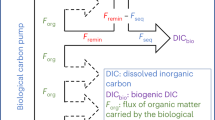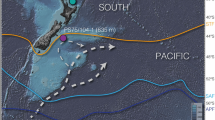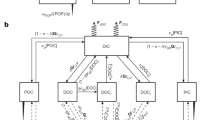Abstract
The equatorial Pacific Ocean makes a significant contribution to global carbon fluxes through both degassing of CO2 to the atmosphere and new primary production1–4; the eastern and central region is the source of most of the 1–2 Pg (1015 g) of CO2 supplied annually to the atmosphere by the equatorial oceans5, and new primary production in the region may account for up to 18–56% of this global oceanic value6. The fate of carbon fixed by new primary production—whether removed to the deep ocean as sinking particles or retained in surface waters requires critical assessment because of the very different timescales of C removal that each process entails. Here we evaluate the transformations of carbon and nitrogen compounds in the surface waters of the South Equatorial Current of the Pacific Ocean. We calculate that carbon removed from the surface layer by degassing and sinking organic particles accounted for 41% and 53%, respectively, of the total C depletion during boreal autumn, 1992. The net accumulation of organic matter in the surface layer, a precondition for its eventual transport away from the Equator by horizontal advec-tion, accounted for <6% of the drawdown, in substantial disagreement with the values up to 75% estimated from recent studies7–9.
This is a preview of subscription content, access via your institution
Access options
Subscribe to this journal
Receive 51 print issues and online access
$199.00 per year
only $3.90 per issue
Buy this article
- Purchase on Springer Link
- Instant access to full article PDF
Prices may be subject to local taxes which are calculated during checkout
Similar content being viewed by others
References
Murray, J. W., Barber, R. T., Roman, M. R., Bacon, M. P. & Feely, R. A. Science 266, 58–65 (1994).
Feely, R. A. et al. J. Geophys. Res. 92, 6545–6558 (1987).
Francey, R. J. et al. Nature 373, 326–330 (1995).
Wong, C. S., Chan, Y. H., Page, J. S., Smith, G. E. & Bellegay, R. D. Tellus 45, 64–79 (1993).
Tans, P. P., Fung, I. Y. & Takahashi, T. Science 247, 1431–1438 (1990).
Chavez, F. P. & Barber, R. T. Deep-Sea Res. 34, 1229–1243 (1987).
Feely, R. A. et al. Deep-Sea Res. II 42, 365–386 (1995).
Peltzer, E. T. & Hayward, N. A. Deep-Sea Res. II 43, 1155–1180 (1996).
Libby, P. S. & Wheeler, P. A. Deep-Sea Res. I (in the press).
Hansell, D. A. & Waterhouse, T. Y. Deep-Sea Res. I (in the press).
Lamb, M. F. et al. Data Rep. ERL PMEL-56 (NOAA, Seattle, WA, 1995).
Lukas, R. & Lundstrom, E. J. Geophys. Res. 96, 3343–3357 (1991).
Wanninkhof, R. et al. Deep-Sea Res. II 42, 387–409 (1995).
Redfield, A. C., Ketchum, B. H. & Richards, F. A. in The Sea Vol. 2 (ed. Hill, M. N.) 26–77 (Wiley, New York, 1963).
Author information
Authors and Affiliations
Rights and permissions
About this article
Cite this article
Hansell, D., Bates, N. & Carlson, C. Predominance of vertical loss of carbon from surface waters of the equatorial Pacific Ocean. Nature 386, 59–61 (1997). https://doi.org/10.1038/386059a0
Received:
Accepted:
Issue Date:
DOI: https://doi.org/10.1038/386059a0
This article is cited by
-
Modeling dissolved organic carbon and carbon export in the equatorial Pacific Ocean
Geo-Marine Letters (2015)
-
ENSO related variations in biogeochemistry of AA and HA in settling particles along the equatorial Pacific Ocean
Journal of Oceanography (2007)
Comments
By submitting a comment you agree to abide by our Terms and Community Guidelines. If you find something abusive or that does not comply with our terms or guidelines please flag it as inappropriate.



